SABB PMI in March Output and new orders continue to grow
-
Wealth Management
-
-
Low Limit Credit Cards
-
Debit Cards
-
Prepaid Card
-
ICSAB+
-
Finance
-
Help & Support
-
-
Help & Support
-
Cards
-
-
-
Tools & Resources
-
Ways to Bank
-
Help & Support
-
ESG at SAB
-
Security
-


Frequently Asked Questions
Have questions about SAB banking services? Let us help you with these frequently asked questions.
FAQSCustomer Service
Our friendly Customer Support team are on hand to help with any queries you have. We're here to help!
Contact UsQuick Links
April 2012

The Saudi British Bank “SABB” has published the results of the headline SABB HSBC Saudi Arabia Purchasing Managers’ Index™ (PMI™) for March 2012 – a monthly report issued by the bank and HSBC. It reflects the economic performance of Saudi Arabian non-oil producing private sector companies through the monitoring of a number of variables, including output, orders, prices, stocks and employment. Saudi Arabian non-oil private sector companies continued to benefit from favourable business conditions in March. Solid market demand boosted new order levels and led to another strong rise in output. Panellists indicated that budget stimulus measures had, in part, strengthened domestic demand while the rising oil prices had the knock-on impact of increased spending across the GCC economies. Registering 58.7 in March, the headline PMI was down on February’s reading of 59.6. Nevertheless, the latest figure was consistent with a strong improvement in operating conditions across the Saudi Arabian non-oil private sector. Favourable economic conditions across the GCC region were a key reason for stronger market demand in March, according to panellists. Overall incoming new work rose at a sharp pace, albeit the slowest for three months. Foreign demand was solid, but anecdotal evidence indicated a divergence between new export business growth from clients in the Middle East and weaker spending from European customers. Rising levels of new business put pressure on capacity during March. Despite another increase in employment, backlogs accumulated at a solid pace. Reports indicated that a number of firms had delayed production due to preparation for new work. Strong current inflows of new work, and an anticipation of further improvements in demand, meant that KSA non-oil private sector firms raised buying activity at a marked rate in March. This in turn led to higher input stocks. Despite stronger demand for inputs, suppliers’ delivery times continued to shorten during March. The rate of improvement in vendor performance was the weakest for six months, however. Panellists cited efficient service and competition amongst suppliers as the principal reasons for faster deliveries. Overall input price inflation faced by Saudi Arabian non-oil private sector companies eased during March, falling notably from February’s nine-month high. Rising purchase prices continued to provide the main impetus to total input cost inflation. Purchasing prices were pushed up by higher prices for fuel, raw material and foodstuffs on the month. Staff costs meanwhile rose at a slower pace over the survey period. Saudi Arabian non-oil private sector firms raised their charges in March. Output price inflation was the strongest for eight months, as reports indicated that firms sought to pass on increased cost burdens amid favourable underlying demand conditions.
Your are now leaving this site
Your are now leaving this site
You are about to leave this site. You are being redirected to an external site. Would you like to leave this site?
© SAB, Saudi Arabia. All Rights Reserved, 2025
Saudi Awwal Bank, a listed joint stock company, incorporated in the Kingdom of Saudi Arabia, with paid in capital of SAR 20,547,945,220, commercial registration certificate 1010025779, unified number 7000018668, Mailing Address: P.O. Box 9084, Riyadh 11413. National Address: 7383 King Fahad Branch Rd, 2338 Al Yasmeen Dist., 13325 Riyadh, Kingdom of Saudi Arabia, Tel. +966 11 4050677, www.sab.com, licensed pursuant to the Council of Ministers Resolution No. 198 dated 06/02/1398H and Royal Decree No. M/4 dated 12/08/1398H, and regulated and supervised by the Saudi Central Bank.